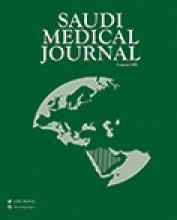This year 2020 will be a year of clarity for Saudi Medical Journal (SMJ) on its path to more achievements. Along with the rest of the editors, we would like to recognize and express our appreciation to our dear authors, reviewers, readers, editorial board members and staff for their contributions and dedication.
2019 marks Saudi Medical Journal’s 40th Anniversary. The Journal has been published and mailed continuously since 1979.
It is particularly gratifying that SMJ has long-held the position of the longest-running, independently published scientific journal in the region.
Our continued success is anchored upon by our vision and values. Adhering to it sustains us in creating effective plans and making sound decisions.
Scholar One,1 the new editorial management system of SMJ, rolled out in full swing third quarter of 2019. This is part of our commitment to improve our processes to better serve our authors and reviewers. Scholar One is a familiar interface used by many journals. In a nutshell, authors and volunteer reviewers find it user-friendly and intuitive to use. Scholar One, in terms of peer review, allows us to track from a glance whether a manuscript has been accepted by a reviewer; declined; needed an alternative reviewer; has been pending and overdue.
Saudi Medical Journal is keen to publish different medical subjects of high quality peer-reviewed manuscripts, recommended by at least 2 reviewers but struggles to have good response from reviewers. Poor response from reviewers is a global problem. Their busy schedules constraint them to perform peer review tasks.
Peer review remains a challenging task for the Journal. On average, only 10% of the total number of invited reviewers agreed to our requests. It is however noteworthy, 73% of the reviewers were able to accomplish the peer review task within 2 weeks. The length of peer review process varies. Two rounds of review is necessary for highly specialized topics or manuscripts which require in-depth review. It entails longer period of time.
We are however optimistic that peer review continues to improve in the years ahead as the Journal consistently implements better automated processes.
In addition, we have made efforts to diversify the editorial board to include members from all the common specialties to improve the quality of the submitted articles and streamline the process of peer review.
Saudi Medical Journal is keen to strictly adhere to the policies and regulations of the Committee of Publications Ethics (COPE).2 As a result, we effectively utilize E-services, which help us track and detect plagiarism and manage it accordingly. Other issues of ethical misconduct were noticed to be much less than what it used to be.
We highly suggest to read the updated Information to Author (ITA), which is available in our website (https://www.smj.org.sa/index.php/smj/information/authors),3 to ensure that submitted manuscripts conform to the requirements of the Journal.
In addition to publication of scientific work, SMJ extends its efforts to educate junior doctors and health researchers in an attempt to raise awareness of the medical publications. Saudi Medical Journal continues to hold medical publication workshops that aim to teach the candidates about the publication ethics and guide them through the process of writing a publishable manuscript.
It is very noticeable that we are lately receiving a large number of submissions from Saudi Arabia. Although this is encouraging and delighting, we still need to maintain our international identity, aiming to share medical knowledge and experiences with other countries all over the world, especially in regional countries.
We are pleased with our Journal growth and attracting good manuscripts, and with our latest Journal Impact Factor 1.055 we are definitely keeping an eye on discoverability and visibility of our content ensuring that metadata is up-to-date, properly tagged and enriched contents; encourage more publications from growing interest discipline or trending, medical breakthroughs.
Annual Statistics (Year 2019)
We’ve received 601 manuscripts from which we processed 363 articles that have complied with the journal requirements (Figure 1). Over the past 12 issues, we have published 2 Editorials, 8 Systematic Reviews, and 128 Originals, with a total of 1301 pages. Sixty-six percent of the papers we published were from the Kingdom of Saudi Arabia (Table 1). Our total rejection rate was 68% of which 39% were rejected at the initial decision.
Type of manuscripts received for the year 2019.
Origin of “peer-reviewed” articles published in the Saudi Medical Journal for the year 2019.
The average processing of original articles in the year 2019 from received date to acceptance was 3.3 months (Table 2). Our aim is to bring time to publication in the shortest possible time frame to achieve the highest expectations. As mentioned above, plans are taken to make this more efficient and effective.
Average processing time frame of articles published in the Saudi Medical Journal for the year 2019.
We are grateful for the invaluable contribution of our board members. And we are reaching out to relevant societies to nominate interested and qualified members to join the editorial team.
We could not be the Journal that we are without the input and support from you. Again we would like to thank everyone and we wish you success!
- Copyright: © Saudi Medical Journal
This is an open-access article distributed under the terms of the Creative Commons Attribution-Noncommercial-Share Alike 3.0 Unported, which permits unrestricted use, distribution, and reproduction in any medium, provided the original work is properly cited.







